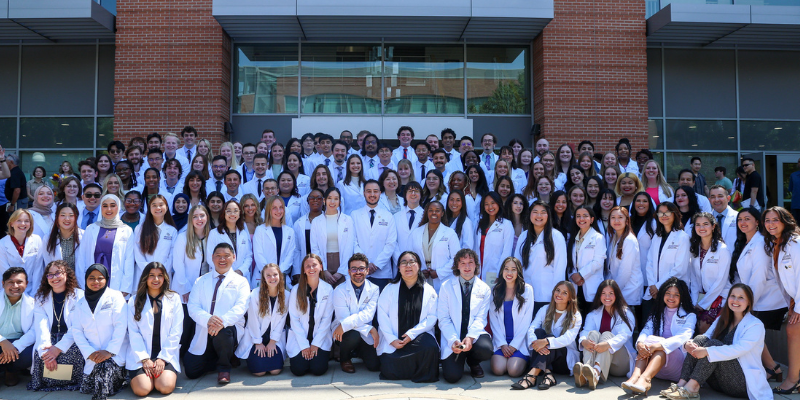By Michael Chan
I remember a year ago sending an email to Director Brunson at the School of Pharmacy asking a rather simple, but rather absurd question: Would I get in trouble for working in a marijuana dispensary? Would I get kicked out of school? Yes, I seriously did contemplate it, and in some regard, I like to dream and think of strange possibilities. Who knows, maybe 20 years from now students will be doing cannabis rotations. Odder things have happened in this world, like the discovery of vaccinations, sliced bread, or beta-blockers for HFrEF. Isn't it weird how, once upon a time, these were considered contraindications in heart failure but are now standards of care? Or how about bread— seriously, who thought it would be a good idea to add fungus to flour dough?
Kidding aside, I've learned at least one simple lesson from pharmacy school: Nothing ventured, nothing gained—the question that is not asked will never be answered.
Thankfully, Brunson did indeed field my question respectfully, even asking for input from Dr. Moore, as well, for the ramifications of the question, "can a pharmacy student work in a dispensary?". Common sense would dictate they should not, but like almost everything else, healthcare evolves, and what was once true may no longer hold. Needless to say, with their counsel, I never did end up working in a marijuana dispensary, but on the plus side, I haven't gotten kicked out of school (so far).
But, ideas and questions have a way of opening up opportunities. Not all questions need be a call to action, but through entertaining possibilities, more avenues reveal themselves, like casting a light into darkness. The fact that Brunson and Moore treated my question seriously and with respect made me realize that nobody was going to chop my head off for asking a strange question (within reason, of course). Indeed, during my long-term care rotation (where I now work part-time as an intern), one of our pharmacists said:
"Always ask questions."
It is asking questions that led to both my internships in addition to the opportunity to write this very essay.
So what led me to write this was a meeting I had with Dr. Borgelt and Dr. Franson a week or so ago, where they suggested I ought to write a few pieces from the CU Denver pharmacy student perspective. I realize this is becoming a bit of novel, but in case you couldn't tell by now, I love to write – although I admit my style tends to be meandering, colloquial and heavily anecdotal (basically the opposite of what a stereotypical pharmacy student ought to be). So, I shall tell one final story for now:
So, after my bizarre question to Director Brunson, she had emailed me sometime later saying that Dr. Franson was looking for co-authors to a review an article that was being written. I was very grateful she remembered my interest, so I signed up.
The result was... I ended up not writing on the paper. The reason is that there was actually a medical student with my very same name and for probably the past 4-5 years, our emails have been getting mixed up, and we've had to forward things back and forth to each other. Quite a mess, although it is a valuable learning point especially for people working in healthcare: Make sure you have the right person! At our long-term care pharmacy, we do get residents with the same name at the same facility.
It was an honest mistake in miscommunication, and when I followed up with Dr. Franson, she said there would be other opportunities for me, which is how I am writing this now. But what I've found in pharmacy school is: Communicate. That is actually the same bit of advice our consultant pharmacist gave me when I went to one of our nursing homes with him: Communication is your most valuable weapon in healthcare. That means you have to be persistent, because things get lost in the shuffle. We're all human, we all forget, and two heads are often better than one.
Professors have a lot on their plate and they get inundated with a lot of emails. I think Dr. Borgelt said she had like, 500 in two days or some record-breaking figure. I sometimes don't see emails, and I get nowhere near that many, so... from the students' perspective (and this is really more a reminder for my fellow students): Please be cognizant of this when you work with your professors. This means not bombarding them with emails, but also not being afraid to follow-up with them if you don't hear back. If it's your project, that's your baby, and you need to follow-up on it if you want it to see the light of day.
I'm not a fan of the “us vs. them” concept in pharmacy school, and I see it more than I would like to. Professors will take the time to listen and help you where they can, but, ultimately, I think it is the student's responsibility to do the legwork. Closing thoughts for students: Don't expect everything to be handed to you on a silver platter, learn from your mistakes, and very importantly, communicate and ask questions.



